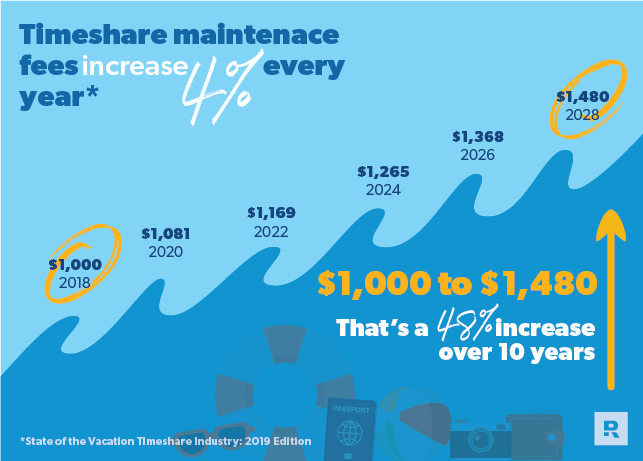Some timeshares provide "versatile" or "drifting" weeks. This plan is less rigid, and allows a buyer to select a week or weeks without a set date, however within a certain period (or season). The owner is then entitled to book his/her week each year at any time throughout that time duration (subject to schedule).
Given that the high season may stretch from December through March, this gives the owner a little trip versatility. What type of home interest you'll own if you purchase a timeshare depends upon the kind of timeshare bought. Timeshares are generally structured either as shared deeded ownership or shared leased ownership.
The owner gets a deed for his/her portion of the unit, specifying when the owner can use the home. This means that with deeded ownership, many deeds are provided for each property. For example, a condo system sold in one-week timeshare increments will have 52 total deeds when totally offered, one released to each partial owner.
Each lease arrangement entitles the owner to utilize a particular residential or commercial property each year for a set week, or a "drifting" week throughout a set of dates. If you purchase a rented ownership timeshare, your interest in the residential or commercial property usually ends after a certain regard to years, or at the most recent, upon your death.
This suggests as an owner, you may be restricted from selling or otherwise transferring your timeshare to another. Due to these elements, a leased ownership interest may be purchased for a lower purchase rate than a comparable deeded timeshare. With either a rented or deeded type of timeshare structure, the owner purchases the right to use one particular home.
To provide higher flexibility, numerous resort advancements take part in exchange programs. Exchange programs allow timeshare owners to trade time in their own residential or commercial property for time in another taking part property. For example, the owner of a week in January at a condominium unit in a beach resort might trade the home for a week in a condo at a ski resort this year, and for a week in a New York City lodging the next (timeshare how it works).
Normally, owners are restricted to choosing another residential or commercial property classified comparable to their own. Plus, extra fees prevail, and popular properties might be challenging to get. Although owning a timeshare means you won't require to toss your money at rental accommodations each year, timeshares are by no ways expense-free. Initially, you will require a piece of cash for the purchase price.
Getting My How To Purchase A Timeshare To Work
Given that timeshares hardly ever keep their value, they will not get approved for financing at most banks. If you do discover a bank that concurs to finance the timeshare purchase, the rates of interest is sure to be high. Alternative funding through the designer is normally readily available, but once again, only at high rates of interest.
And these charges are due whether the owner utilizes the home. Even worse, these fees commonly intensify constantly; often well beyond a budget-friendly level. You may recover some of the costs by leasing your timeshare out throughout a year you don't utilize it (if the rules governing your specific property allow it).
Getting a timeshare as an investment is hardly ever an excellent idea. Considering that there are numerous timeshares in the market, they seldom have good resale potential. Instead of appreciating, many timeshare diminish in worth as soon as acquired. Lots of can be tough to resell at all. Rather, you must think about the worth in a timeshare as an investment in future getaways.
If you vacation at the exact same resort each year for the exact same one- to two-week duration, a timeshare may be a fantastic way to own a residential or commercial property you enjoy, without incurring the high expenses of owning your own home. (For information on the costs of resort own a home see Budgeting to Buy a Resort House? Expenditures Not to Overlook.) Timeshares can likewise bring the comfort of understanding just what you'll get each year, without the trouble of reserving and leasing accommodations, and without the worry that your preferred location to remain won't be readily available.

Some even provide on-site storage, allowing you to conveniently stash devices such as your surfboard or snowboard, preventing the trouble and cost of hauling them backward and forward. And even if you may not use the timeshare every year does not indicate you can't enjoy owning it. Many owners enjoy periodically lending out their weeks to good friends or loved ones.
If you don't desire to holiday at the very same time each year, versatile or floating dates provide a great option. And if you want to branch off and check out, consider utilizing the property's exchange program (make sure an excellent exchange program is provided before you buy). Timeshares are not the very best solution for everyone (how to rent out your timeshare).
Also, timeshares are typically unavailable (or, if available, unaffordable) for more than a few weeks at a time, so if you normally getaway for a 2 months in Arizona throughout the winter season, and spend another month in Hawaii throughout the spring, a timeshare is probably not the finest choice. In addition, if saving or generating income is your primary issue, the lack of investment potential and ongoing expenditures included with a timeshare (both talked about in more detail above) are certain disadvantages.
Get This Report about How To Get Out Of A Wyndham Timeshare Contract
The purchase of a timeshare a way to own a piece of a getaway residential or commercial property that you can use, usually, when a year is frequently a psychological and spontaneous choice. At our wealth management and planning firm (The H Group), we occasionally get questions from customers about timeshares, the majority of calling after the truth fresh and tan from a trip questioning if they did the ideal thing.
If you're considering purchasing a timeshare, so you'll belong to trip routinely, you'll want to understand the various types and the pros and cons. (: Timely Timeshare Tips for Families) Initially, a little background about the four kinds of timeshares: The purchaser generally owns the rights to a particular system in the exact same week, year in and year out, for as long as the contract stipulates.
With a fixed-rate timeshare, the owner can rent his block of time or trade with owners of other homes. This kind of arrangement works best if you have an extremely preferable location. The buyer can reserve his own time throughout a given duration of the year. This choice has more flexibility than the set week version, but getting the precise time you want might be difficult when other investors snap up much of the prime periods.

The designer maintains ownership of the home, however. This resembles the floating timeshare, however buyers can stay at different locations depending upon the amount of You can find out more points they have actually collected from purchasing into a particular home or purchasing points from the club. The points are used like currency and timeslots at the property are scheduled on a first-come basis.
Thus, the use of a really pricey property might be more economical; for one thing you don't require to stress over year-round maintenance. If you like predictability, you have actually a guaranteed getaway location. https://pbase.com/topics/karion5aiv/unknownf248 You might have the ability to trade times and locations with other owners, permitting you to travel to new places.